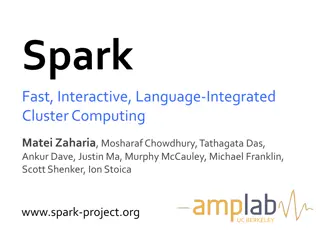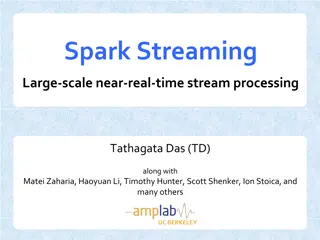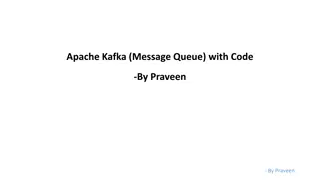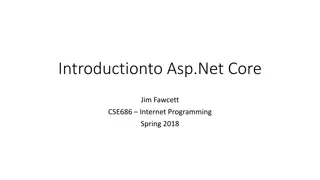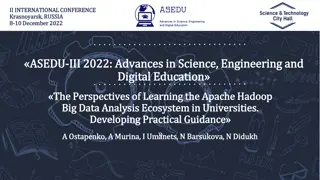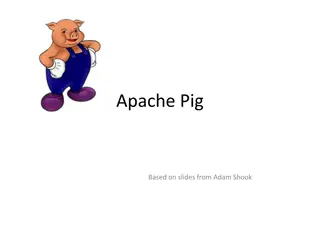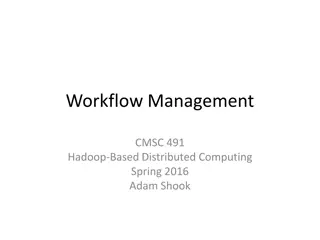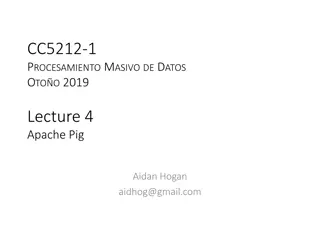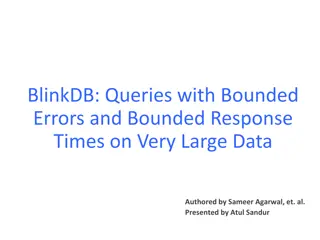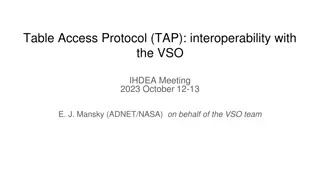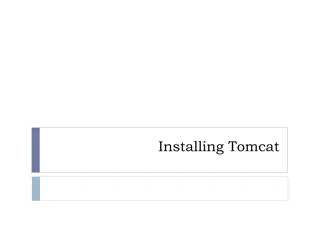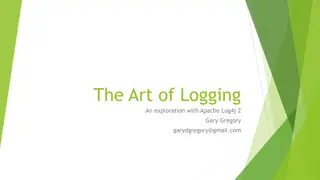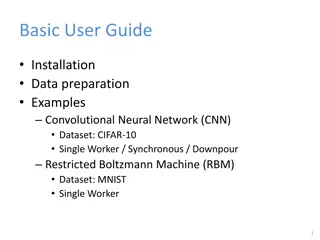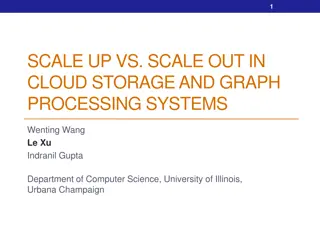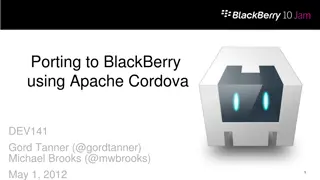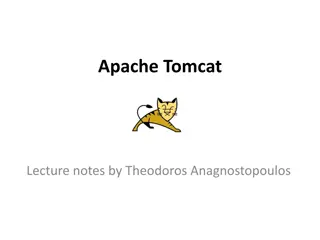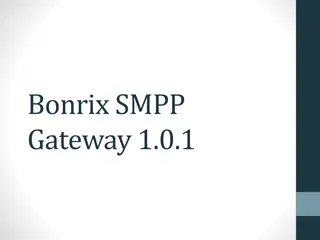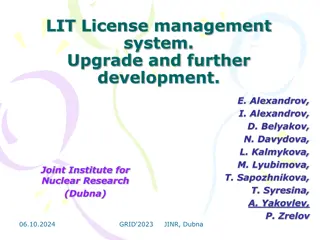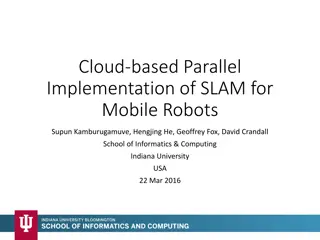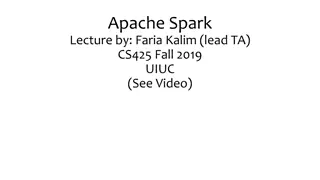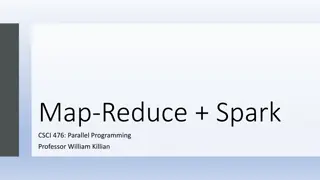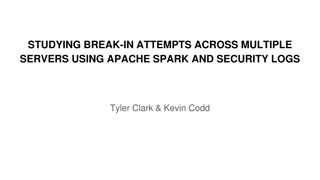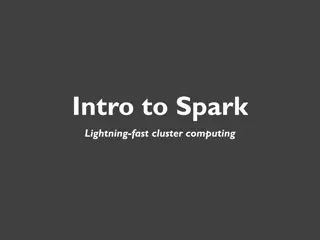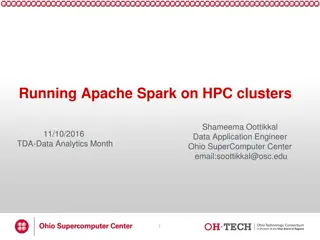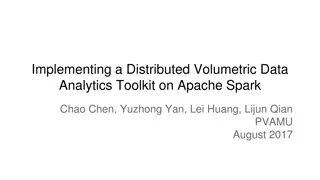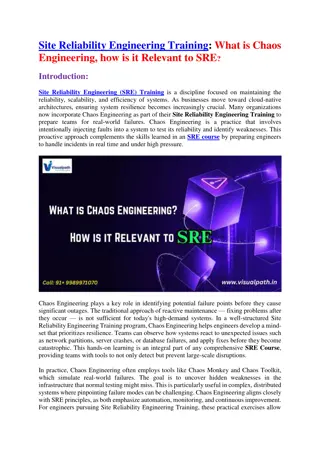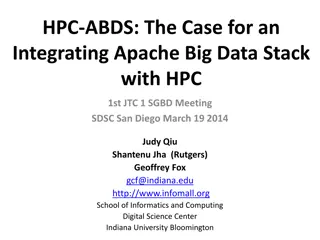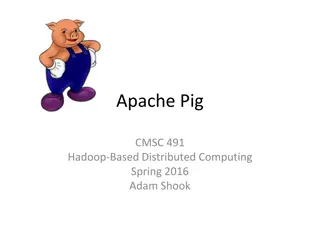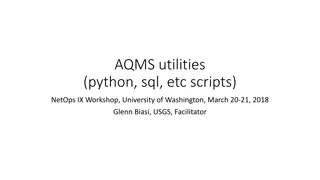Apache MINA: High-performance Network Applications Framework
Apache MINA is a robust framework for building high-performance network applications. With features like non-blocking I/O, event-driven architecture, and enhanced scalability, MINA provides a reliable platform for developing multipurpose infrastructure and networked applications. Its strengths lie i
4 views • 13 slides
Get Ready to Pass the Databricks Developer for Apache Spark - Scala Exam
Begin your preparation journey here: \/\/bit.ly\/3W0ZIga. Discover comprehensive details on the Data Engineer Associate certification exam, including tutorials, practice tests, books, study materials, exam questions, and the syllabus. Solidify your understanding of Data Engineering and prepare to su
4 views • 14 slides
Apache Spark: Fast, Interactive, Cluster Computing
Apache Spark, developed by Matei Zaharia and team at UC Berkeley, aims to enhance cluster computing by supporting iterative algorithms, interactive data mining, and programmability through integration with Scala. The motivation behind Spark's Resilient Distributed Datasets (RDDs) is to efficiently r
0 views • 41 slides
Introduction to Spark Streaming for Large-Scale Stream Processing
Spark Streaming, developed at UC Berkeley, extends the capabilities of Apache Spark for large-scale, near-real-time stream processing. With the ability to scale to hundreds of nodes and achieve low latencies, Spark Streaming offers efficient and fault-tolerant stateful stream processing through a si
0 views • 30 slides
Real-Time Data Insights with Azure Databricks
Processing high-volume data in real-time can be achieved efficiently using Azure Databricks, a powerful Apache Spark-based analytics platform integrated with Microsoft Azure. By transitioning from batch processing to structured streaming, you can gain valuable real-time insights from your data, enab
0 views • 23 slides
Apache Kafka: A Messaging System Overview
Apache Kafka is a powerful software platform that facilitates data exchange between applications, servers, and processors through a distributed streaming process. Originally developed by LinkedIn and now maintained by Confluent under the Apache Software Foundation, Kafka serves as a robust message s
2 views • 29 slides
Introduction to ASP.Net Core: Building Web Applications
ASP.Net Core is a powerful framework for building and executing both console and web applications. It provides hosting options like Kestral, IIS, Apache, and Nginx, making it versatile for various deployment environments. The framework offers a robust middleware pipeline that supports pluggable serv
4 views • 11 slides
Perspectives on Learning Apache Hadoop for Big Data Analysis in Universities
Analyzing Big Data processing technologies and providing practical guidance on installing and working with Apache Hadoop for its application in universities. Big Data technologies offer solutions in various economic sectors, making knowledge of Apache Hadoop essential for students. Launching the Had
0 views • 7 slides
Real-World Concurrency Bugs and Detection Strategies
Explore the complexities of real-world concurrency bugs through a study of 105 bugs from major open-source programs. Learn about bug patterns, manifestation conditions, diagnosing strategies, and fixing methods to improve bug detection and avoidance. Gain insights from methodologies evaluating appli
0 views • 20 slides
FSST v. Noem: Legal Battle Over Casino Amenities Use Tax
The legal case of FSST v. Noem involves South Dakota's refusal to renew the Flandreau Santee Sioux Tribe's casino alcohol licenses due to the tribe's customers being required to pay a use tax on all purchases at the casino, including gaming amenities. The 8th Circuit Court ruled that the use tax on
0 views • 16 slides
Introduction to Apache Pig: A High-level Overview
Apache Pig is a data flow language developed by Yahoo! and is a top-level Apache project that enables non-Java programmers to access and analyze data on a cluster. It interprets Pig Latin commands to generate MapReduce jobs, simplifying data summarization, reporting, and querying tasks. Pig operates
0 views • 57 slides
Introduction to Apache Oozie Workflow Management in Hadoop
Apache Oozie is a scalable, reliable, and extensible workflow scheduler system designed to manage Apache Hadoop jobs. It facilitates the coordination and execution of complex workflows by chaining actions together, running jobs on a schedule, handling pre and post-processing tasks, and retrying fail
0 views • 24 slides
Processing Big Data with Apache Pig in Hadoop Ecosystem
Explore how Apache Pig can be utilized in the Hadoop ecosystem to process large-scale data efficiently. Learn about concepts such as handling multiple inputs, job chaining, setting reducers, and utilizing a distributed cache. Compare Hadoop with SQL and understand why SQL might not be suitable for l
0 views • 78 slides
Energy Task Force Meeting Summary August 18, 2010
The Energy Task Force meeting on August 18, 2010, discussed various topics including new legislation, entrants in Alaska's energy sector, the Alaskan Clear & Equitable Share program, gas storage proposals, and incentives for companies like Apache and Buccaneer. The meeting highlighted the importance
0 views • 9 slides
Overview of BlinkDB: Query Optimization for Very Large Data
BlinkDB is a framework built on Apache Hive, designed to support interactive SQL-like aggregate queries over massive datasets. It creates and maintains samples from data for fast, approximate query answers, supporting various aggregate functions with error bounds. The architecture includes modules f
0 views • 26 slides
Apache Traffic Control Update Highlights
Apache Traffic Control provides insights into recent changes and upcoming developments, including Traffic Router updates, DNSSEC implementation, monitoring changes, and roadmap fixes. Stay informed about the project's progress and future plans.
0 views • 8 slides
Integration of REST/TAP Services into VSO Metadata DB Table
Current status of REST/TAP code implementation in the VSO along with the integration details of REST/TAP services into the VSO metadata DB table. The post discusses the interoperability with VSO IHDEA meeting, production status, available services, and the Apache session ID for distinguishing querie
0 views • 12 slides
Overview of Installing Apache Tomcat Server
Learn about the process of installing Apache Tomcat server for running web applications over the Internet. This guide covers the components of a web application, the role of HTTP protocol, and details about Apache Tomcat as a Java-capable HTTP server. Follow step-by-step instructions for downloading
0 views • 25 slides
The Art of Logging: An Exploration with Apache Log4j 2 by Gary Gregory
Delve into the world of logging with Apache Log4j 2 through the insightful exploration presented by Gary Gregory, a Principal Software Engineer at Rocket Software. Discover the importance of logging, key concepts like logging architecture and APIs, and the significance of modern logging frameworks s
0 views • 72 slides
Managing BEAST Alarm System: Enhancing Alarm Monitoring and Analysis
Explore how managing the BEAST alarm system with a detailed alarm history helps in better understanding event sequences, producing alarm statistics, identifying nuisance alarms, and finding patterns. The operations alarm dashboard provides visualization, trends, and statistics with advanced filterin
0 views • 5 slides
Guide to Setting Up Neural Network Models with CIFAR-10 and RBM Datasets
Learn how to install Apache Singa, prepare data using SINGA recognizable records, and convert programs for DataShard for efficient handling of CIFAR-10 and MNIST datasets. Explore examples on creating shards, generating records, and implementing CNN layers for effective deep learning.
0 views • 23 slides
Comparing Scale-Up vs. Scale-Out in Cloud Storage and Graph Processing Systems
In this study, the authors analyze the dilemma of scale-up versus scale-out for cloud application users. They investigate whether scale-out is always superior to scale-up, particularly focusing on systems like Hadoop. The research provides insights on pricing models, deployment guidance, and perform
0 views • 27 slides
Porting to BlackBerry using Apache Cordova - Development Insights
Explore the process of porting to BlackBerry using Apache Cordova as shared by Gord Tanner and Michael Brooks. Discover tips on overcoming challenges, ensuring compatibility, and leveraging HTML5 for a smoother transition to the BlackBerry platform.
0 views • 25 slides
Apache Tomcat: An Open Source Implementation of Java Servlet and JSP Technologies
Apache Tomcat is an open-source software implementing Java Servlet and JavaServer Pages technologies. It is developed under the Java Community Process and released under the Apache License version 2. Apache Tomcat powers large-scale web applications and is a collaboration of developers worldwide. Le
0 views • 6 slides
Bonrix SMPP Gateway 1.0.1 Overview
Bonrix SMPP Gateway 1.0.1 is a J2EE web application that allows clients to connect via TCP-IP or HTTP API. It provides an administrative web interface for managing users, SMS termination settings, and offers various SMS termination mechanisms. The system uses MySQL and MongoDB as database servers an
0 views • 24 slides
License Management System Upgrade and Development Overview
This project focuses on upgrading and enhancing the license management system at the Joint Institute for Nuclear Research in Dubna. It addresses challenges related to optimizing license usage through different types of licenses and monitoring systems. The system architecture includes components like
0 views • 18 slides
Scalable Causal Consistency for Wide-Area Storage with COPS
This paper discusses the implementation of scalable causal consistency in wide-area storage systems using COPS. It delves into the key-value abstraction, wide-area storage capabilities, desired properties such as ALPS, scalability improvements, and the importance of consistency in operations. Variou
0 views • 42 slides
Cloud-based Parallel Implementation of SLAM for Mobile Robots
This research focuses on a cloud-based parallel implementation of Simultaneous Localization and Mapping (SLAM) for mobile robots. It explores the use of cloud computing to enhance the efficiency and accuracy of SLAM algorithms, enabling robots to build maps and estimate their positions simultaneousl
0 views • 11 slides
Introduction to Apache Spark: Simplifying Big Data Analytics
Explore the advantages of Apache Spark over traditional systems like MapReduce for big data analytics. Learn about Resilient Distributed Datasets (RDDs), fault tolerance, and efficient data processing on commodity clusters through coarse-grained transformations. Discover how Spark simplifies batch p
0 views • 17 slides
Introduction to Map-Reduce and Spark in Parallel Programming
Explore the concepts of Map-Reduce and Apache Spark for parallel programming. Understand how to transform and aggregate data using functions, and work with Resilient Distributed Datasets (RDDs) in Spark. Learn how to efficiently process data and perform calculations like estimating Pi using Spark's
0 views • 11 slides
Analyzing Break-In Attempts Across Multiple Servers using Apache Spark
Exploring cyber attacks on West Chester University's servers by analyzing security logs from five online servers using Apache Spark for large-scale data analysis. Uncovering attack types, frequency patterns, and sources to enhance security measures. Discover insights on break-in attempts and potenti
0 views • 19 slides
Introduction to Spark: Lightning-fast Cluster Computing
Apache Spark is a fast and general-purpose cluster computing system that provides high-level APIs in Java, Scala, and Python. It supports a rich set of higher-level tools like Spark SQL for structured data processing and MLlib for machine learning. Spark was developed at UC Berkeley AMPLab in 2009 a
0 views • 100 slides
Apache Spark: A Comprehensive Overview
Apache Spark is a powerful open-source cluster computing framework known for its in-memory analytics capabilities, contrasting Hadoop's disk-based paradigm. Spark applications run independently on clusters, coordinated by SparkContext. Resilient Distributed Datasets (RDDs) form the core of Spark's d
0 views • 16 slides
Distributed Volumetric Data Analytics Toolkit on Apache Spark
This paper discusses the challenges, methodology, experiments, and conclusions of implementing a distributed volumetric data analytics toolkit on Apache Spark to address the performance of large distributed multi-dimensional arrays on big data analytics platforms. The toolkit aims to handle the expo
0 views • 33 slides
Comprehensive Guide to Setting Up Apache Spark for Data Processing
Learn how to install and configure Apache Spark for data processing with single-node and multiple-worker setups, using both manual and docker approaches. Includes steps for installing required tools like Maven, JDK, Scala, Python, and Hadoop, along with testing the Wordcount program in both Scala an
0 views • 53 slides
Overview of Delta Lake, Apache Spark, and Databricks Pricing
Delta Lake is an open-source storage layer that enables ACID transactions in big data workloads. Apache Spark is a unified analytics engine supporting various libraries for large-scale data processing. Databricks offers a pricing model based on DBUs, providing support for AWS and Microsoft Azure. Ex
0 views • 16 slides
Site Reliability Engineering Online Training - SRE Course
Join Visualpath for a comprehensive Site Reliability Engineering Training led by industry professionals. Our program includes hands-on projects, real-world scenarios, and interview preparation to help you excel in your SRE career. Access the SRE Course from India, the USA, the UK, Canada, Dubai, and
2 views • 3 slides
Integrating Apache Big Data Stack with HPC Capabilities
This presentation discusses the integration of Apache Big Data Stack with High-Performance Computing (HPC), emphasizing the broad functionality and key abstractions needed for high performance in data analytics. It covers various layers, workflow orchestration, programming models, system principles,
0 views • 22 slides
Introduction to Apache Pig: Hadoop-Based Distributed Computing
Apache Pig is a powerful tool developed by Yahoo! as a top-level Apache project. It enables non-Java programmers to access and analyze data on a cluster using Pig Latin, a dataflow language. By interpreting Pig Latin, Apache Pig generates MapReduce jobs for efficient data summarization, querying, an
0 views • 30 slides
Introduction to Apache Pig in Distributed Computing
Apache Pig is a powerful tool developed by Yahoo! under the Apache project for Hadoop-based distributed computing. It simplifies data processing tasks by using Pig Latin, a dataflow language. Through Pig, users can perform data summarization, ad-hoc reporting, querying, and analysis on large dataset
0 views • 33 slides


